Our Verdict
What Valhalla is trying to do is interesting, but playing it is boring. The dialogue drags, the main bartending mechanic is tedious and the day-in, day-out repetition becomes frustrating quite early on.
PC Gamer's got your back
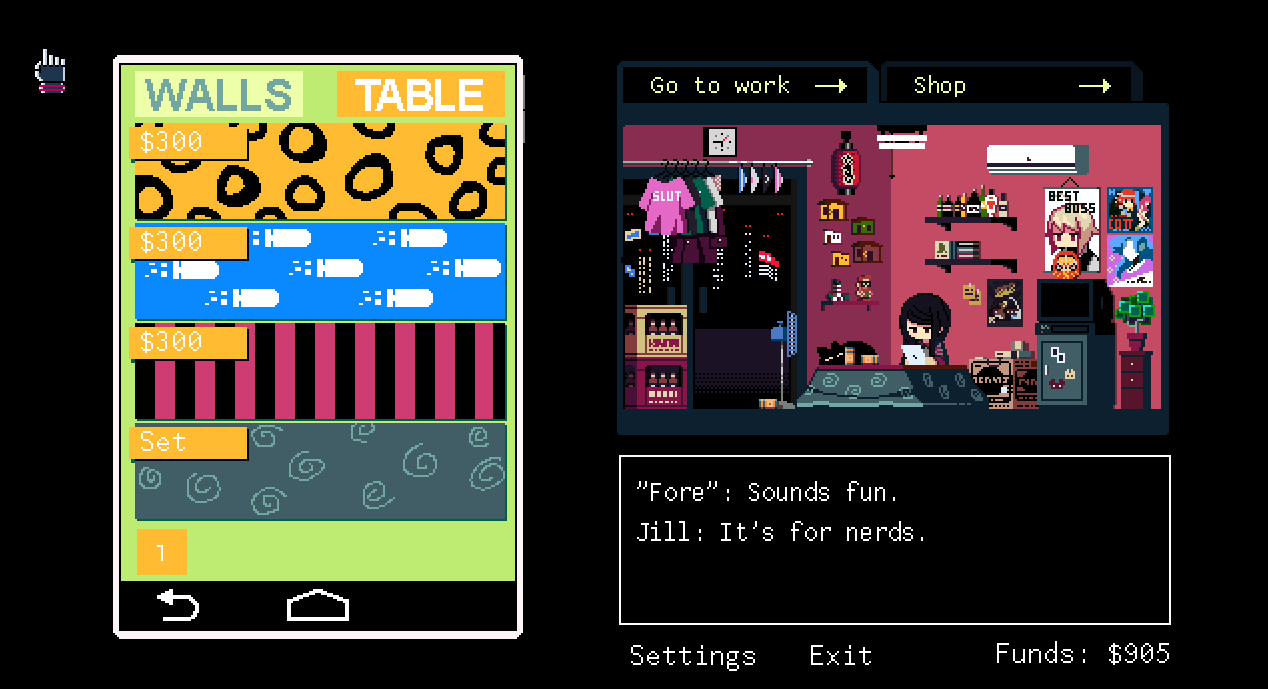
What is it: A cyberpunk bartending game similar to Papers, Please, but with more menus and WAY more dialogue.
Publisher: Ysbyrd Games
Developer: Sukeban Games
Reviewed on: Windows 7
Expect to pay: $15
Multiplayer: No
If you’ve ever worked in a bar, there are certain things you’ll have experienced: sticky surfaces, people complaining that you haven’t poured the Guinness exactly right, “regulars” who expect you to know their usual order because they’d much rather be leering at the waitresses than taking an extra 15 seconds to belch “Carling please, mate” in your general direction.
VA-11 HALL-A, also known as Valhalla for ease of reading and typing, boils all the sticky realities of bartending into something called “Cyberpunk Bartender Action”, a phrase emblazoned across the game by developer Sukeban, which mostly consists of talking and serving drinks. Cyberpunk, yes. Bartending, yes. Action? Definitely not. Valhalla is a passive game of listening to people’s woes as they prop up a bar and occasionally slinging something alcoholic in their direction. Action it is not.
The aim is simple: make drinks, don’t mess up, get paid, pay your bills and buy yourself nice things so you can come back into work feeling happy enough to make more drinks. Repeat.
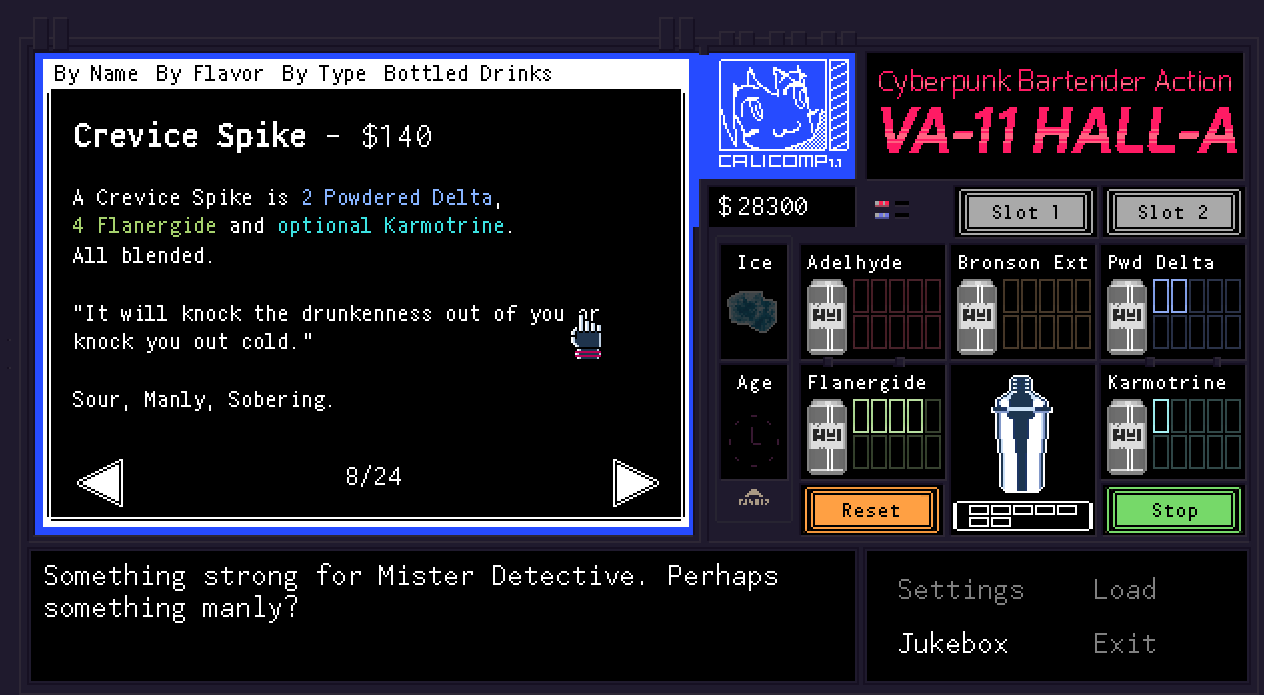
The cyberpunk setting is more interesting than the bartending. Taking place in the not-too-far-off future of the year 207X, in a place called Glitch City, Valhalla explores a world ruled by a nanobot-enabled dictatorship where everyone is infected with technology that can track them, control them and kill them.
There are also robots, known as Lilim, who can be used as military machines and sexbots alike. All this happens on a backdrop of glitchy TVs, neo-Tokyo set design and characters that have various implants in and around their body to let you know visually that things are very different here.
The bartending is much less appealing, distilling a fairly magical and impressive art into banal clicks as you add each ingredient into the mixer one-by-one, sometimes up to ten times each. There are five principal ingredients, and all of them are as sci-fi and confusing as the next: Adelhyde, Bronson Extract, Powdered Delta, Flanerglide and Karmotrine, which you soon find out is the alcoholic component.
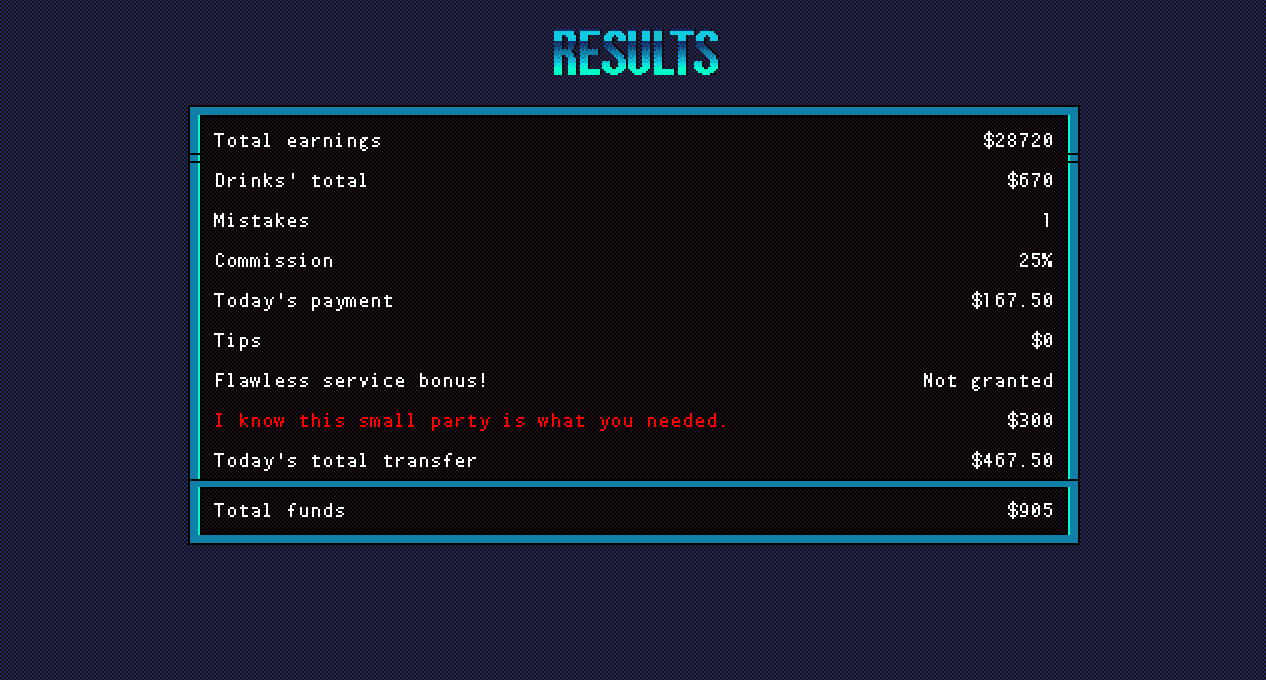
Bartending is treated as a puzzle: someone asks, cryptically, for a cold drink, and you know to find something “on the rocks”. Someone asks for something big, and you double the ingredients. Someone asks for something bitter, and you search for “bitter” in the recipe list. Remembering people’s favourites will also get you far, unlocking new conversation threads as you go.
Keep up to date with the most important stories and the best deals, as picked by the PC Gamer team.
But as interesting as it sounds, this process becomes dull and mechanical very early on. The game is reduced to what seems like endless clicking as the bar conversations drag on and on and on, displayed only ten to twenty words at a time on the screen. Sometimes those conversations are interesting and give you an insight into the gritty and corrupt world outside your saloon doors, but they really drag on when you have to click every two seconds.
The bartending aspect is also barely explained to you, and whether that’s part of the fun of figuring it out or just an assumption that the player has a basic knowledge of mixology is unclear. It takes a while to understand that the difference between mixed and blended drinks is a matter of watching the lump of pixels that represents the cocktail shaker for five seconds more before serving, or that aging a drink is just a matter of clicking on the clock.
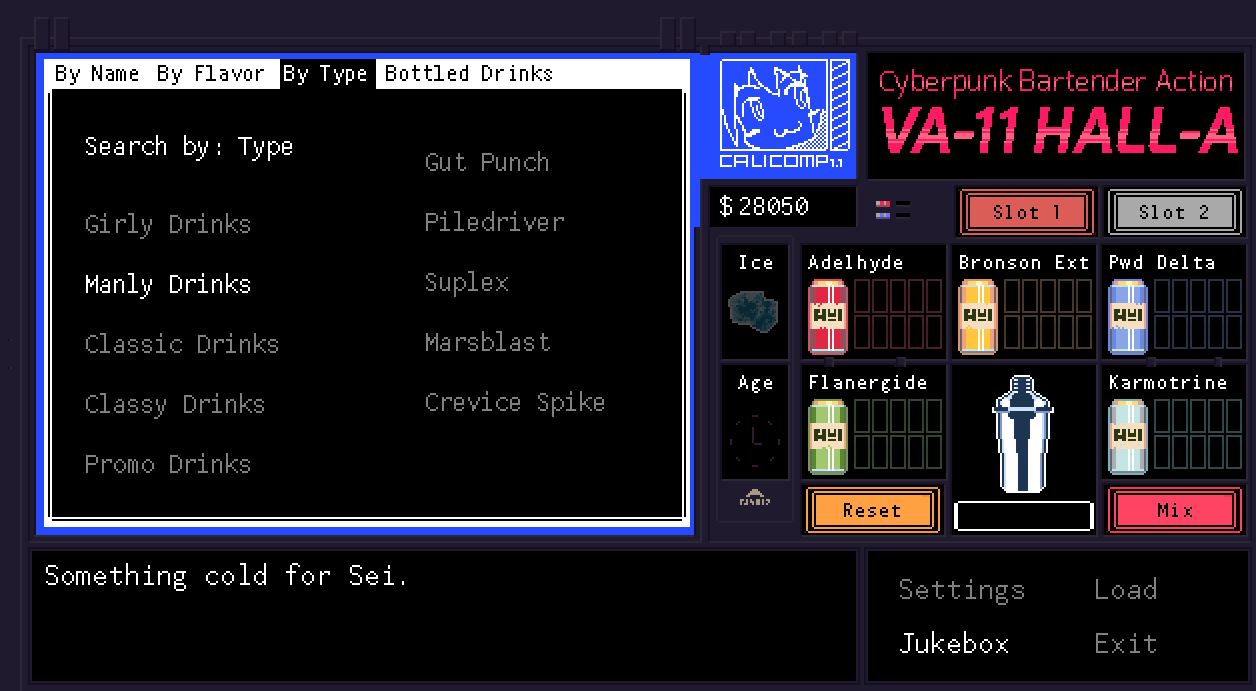
On top of all of this is a strange, unpleasant lingering taste in your mouth about the tone of the game in general. You can be listening to a conversation about how corrupt the press is, or the unethical treatment of robots, and it will effortlessly slip into some strangely casual and lascivious observations about tits and vaginas. Perhaps this would be an interesting side to the story if the observations were challenged in some way, or made a clearer part of the characterisation of the more unscrupulous characters (like the untrustworthy and manipulative newspaper editor) but instead the female protagonist seems to shrug them off like vodka off a duck’s back.
All the women talk to each other like they want to have sex right then and there, which might not be surprising from a game that describes itself as “waifu bartending”, but it’s not usually how women converse—sure, there are women who are hornier than the guy who has to taste-test Viagra, but statistically it’s not every woman you meet, and it can be a bit tiring to have everyone wanting to get in your pants.
Men and women talk about sexbots in a really creepy way, with one character talking about how he wants to check if they’re anatomically correct all over, and it’s made painfully clear that the one sexbot that comes into your bar is made to look between 10 and 13 years old. This is explored a little bit, but accepted a little too quickly—perhaps there’s an interesting point about consent and appearance of age in there, but it’s not really addressed.
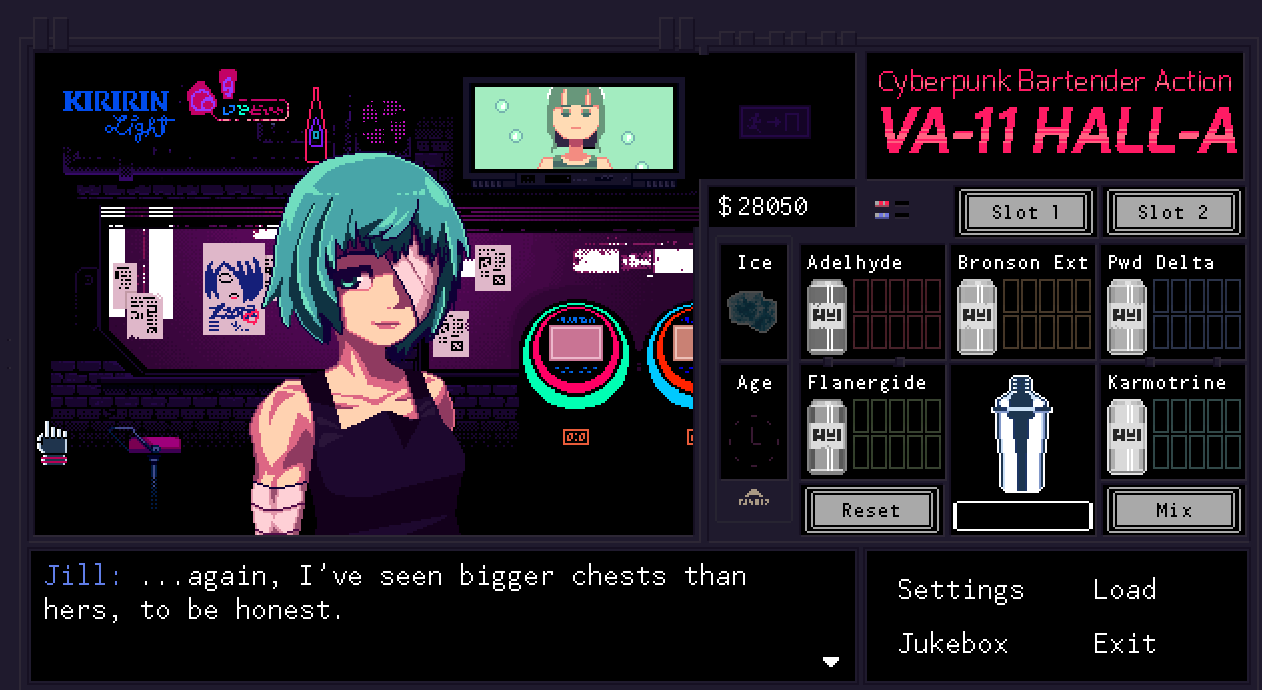
When you’re in-between work shifts, you can go on your phone at home, and open up an app which is essentially the weirder parts of online communities like Reddit, where people speak in memes and call others “normies”. It’s strange that so much of this game can be set in the future, yet the same irritating circle-jerk internet speak still persists.
In the end, it’s hard to find any real reason to crave attention and attraction from any of these “waifus”, apart from an already existing predisposition to one of their types—the girl who looks like a child; the girl who has cat ears; the girl who you’re already informed that your character likes. For all their seemingly endless dialogue, I felt no real connection with any of them.
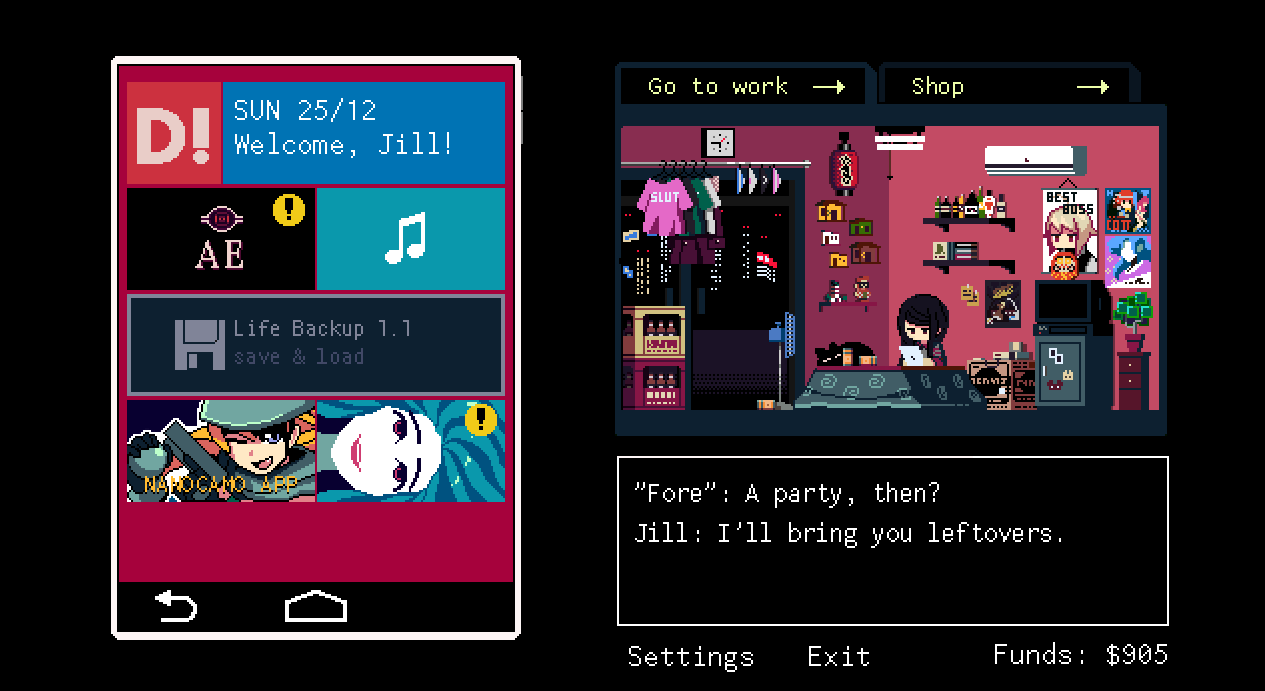
Valhalla is clearly a game after Papers, Please’s heart: a game where the sole interaction you have with someone on the other side of a counter at your menial, boring job. But Papers Please puts power, however minor, in your hands, while Valhalla captures that passive, quiet bartender trope all too well, leaving you feeling powerless and trapped in a repetitive cycle of listening and reassuring as you “yes, and” the dialogue to completion. There’s a certain charm in the realism of it all—these characters flit in and out of your life, and you have no control over what happens outside of your realm, hearing only the snippets that happen inside your inner circle—but it more often comes across as useless than powerless.
Perhaps you find a focus on story and dialogue soothing, and you long for a cyberpunk narrative you can really get your teeth into. In that case, Valhalla might scratch that itch. But you won’t find an experience quite like the excellent Papers, Please here. Instead, Valhalla is a much drier, much more submissive game that’ll have you clicking so much you might get RSI. You might need a stiff one after this.
Disclaimer: VA-11 HALL-A is published by Ysbyrd Games, whose business developer, Cassandra Khaw, sometimes freelances for PC Gamer.
What Valhalla is trying to do is interesting, but playing it is boring. The dialogue drags, the main bartending mechanic is tedious and the day-in, day-out repetition becomes frustrating quite early on.
PC Gamer is the global authority on PC games—starting in 1993 with the magazine, and then in 2010 with this website you're currently reading. We have writers across the US, Canada, UK and Australia, who you can read about here.


